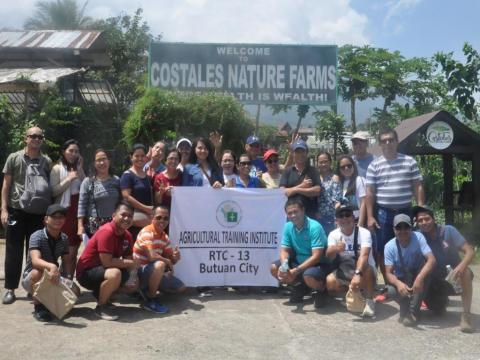ATI-Caraga staff conducted benchmarking at the Costales Nature Farm in Majayjay, Laguna last August 29, 2018.
REGION 4-A (CALABARZON) – The region known for its numerous farmlands and tourist attractions was visited by staff of ATI-Caraga last August 27-31, 2018 purposely to do benchmarking in premiere agri-tourism sites as basis in helping out learning sites in Caraga to become farm tourism magnets in the near future.
The staff documented various innovative farming practices; interviewed owners and farm workers; evaluated farm characteristics and objectives; reviewed how the farm entrepreneur improved its decision-making, farm productivity and sustainability performance; identified possible problems and issues; and later to analyze benchmarking results and disseminate it to farmers and LS cooperators.
On Day 1 of the benchmarking, the group visited Teofely Nature Farm. It is located in the sloping side of Silang, Cavite. This ATI Learning Site is also a DOT-accredited farm tourism site as well as a TESDA-accredited Farm School for raising native pigs and cultivation of organically grown vegetables, fruits and herbs. This 6,600 square meter site is an integrated diversified natural family farm with the ardent drive to promote healthy living through organic farming.
Aside from native pigs, the crops in Teofely Nature Farm are not applied with chemical fertilizers and pesticides. A tour guide explained that since they are practicing organic farming, inputs are minimal and less expensive. The farm only uses natural resources of nutrients such as compost, crop residues, manure and natural methods of crop and weed control.
In the evening of Day 1, the group arrived at Terra Verde Ecofarm located in Brgy. Pantihan, Maragondon, Cavite. Farm tour started in the morning of Day 2. The ecofarm is owned by Atanacio Family headed by brothers Emerson and Ericson Anatacio. Terra Verde was established due an ailment caused by stress experienced by Emerson few years ago. One advise by his doctor was to go into farming due to its therapeutic effect. Hence, he developed the farm as his stress relief at the same time as a source of food for his family. But eventually, they realized it could be a source of income if they are to convert it into a farm tourism site.
According to Ericson, Emerson’s brother and co-owner of Terra Verde, the farm implements three E’s: Entertainment, Education and Enterprise Development. Entertainment in Terra Verde means watching or playing with different animals. Terra Verde has ducks, native pigs, deer, ostrich, chickens, turkeys, horses, carabaos and fish. Wastes of these animals are utilized as fertilizers for the plants namely dragon fruit, banana, guava, papaya, tomatoes, calamansi, lettuce, eggplant, okra, turmeric, herbs among others. Children can also play with remote controlled toys or ride ATVs around the farm.
Next stop was Ato Belen’s Farm which is a one-hectare farm land (main site) owned by Renato “Ato” Belen. His son, Brian, is now managing the farm with the helped of other siblings. The farm is GAP Certified via NICERT and is also an farm tourism site accredited by DOT and an ESP of ATI. Brian is also a Magsasakang Siyentista (MS).
The farm’s goal is to achieve success in all three dimensions of sustainable agriculture: Environmental Development, Economic Development and Social Development. Four family members work for the farm on full-time basis. It employs 17 staff who are paid based on prevailing wage laws, length of service and competencies. The farm accommodates local and international volunteers.
In Ato Belen, the harvest from crops and sales from farm inputs have contributed 80% to the farm’s annual income during the past three years. Only 10% came from livestock and poultry, 7% from services and 3% from value adding.
Brian further said that their biogas technology supplies 50% of the farm’s fuel requirement. They also produce and sell LactoBac LAS-1 which minimizes foul odor in animal growing area and improves quality of soil for crop production. Moreover, they also produce Fish Emulsion Concentrates and Vermi 3 (Compost Tea).
As of August 27, 2018, Ato Belen has attracted 7,225 local and international farm tourists. In 2017, the number of visitors was 7,568.
On the thrid day of the benchmarking, the group went to the first-ever farm-tourism site accredited by DOT – the Costales Nature Farm in Majayjay, Laguna. The farm was founded by the late Ronald Costales who was a former IT specialist. It is an accredited ESP of ATI and a Farm School of TESDA. Costales Nature Farm has an average monthly guests of 4,000. The farm is a eight-hectare sustainable, commercial and certified integrated organic farm supplying organic vegetables. It adopts a holistic approach in farming which includes multi-cropping, companion planting, crop rotation and bacterial pest control. The farm also conducts trainings on Effective Microorganism Activated Solution (EMAS), EM Rice Wash, EM 5, Fermented Fruit Juice (FFJ), Fermented Plant Juice (FPJ), Fish Amino Acid (FAA) and Aerobic Bokashi. EMAS is responsible for the pig pens having no bad smells.
And lastly, the group stopped over at the Forest Wood Garden, located in San Pablo City, Laguna. It is owned by Joel and Myrna Frago who are authors of Bahay na Bunot which was featured in ABS-CBN’s Rated K in 2009. Myrna, being an architect, designed their training hall using coconut products and other eco-friendly materials like Bunot. Forest Wood Garden is a five-hectare ATI Learning Site and DOT-accredited farm tourism site. Like the earlier sites visited, it also practices Integrated Diversified Organic Farming System (IDOFS). The farm has organic fruit-bearing trees such as rambutan, coconut, lanzones, banana, etc. Bamboo is also available which adds shade and coolness around the farm. Organic vegetables are also being grown like squash, pechay and even mushroom to mention a few. There are also livestock and animals like chickens, pigs and wild boar. Forest Wood Garden hired specialists who maintain the farm. They help in the production of white oyster mushrooms which are sold by the farm as additional income.

